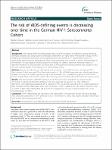The risk of AIDS-defining events is decreasing over time in the German HIV-1 Seroconverter Cohort
Altmann, Mathias
Heiden, Matthias an der
Scheufele, Ramona
Hartmann, Katrin
Houareau, Claudia
Bartmeyer, Barbara
Hamouda, Osamah
Background: With ageing of the HIV-infected population, long-term exposure to treatment, varying adherence, emerging resistance and complications to therapies, effectiveness of Highly Active Antiretroviral Therapy (HAART) needs to be monitored continuously at the population level. The German HIV-1 Seroconverter Cohort is a multi-centre, open, long-term observational cohort including patients with a known or reliably estimated date of HIV-infection i.e. last negative and first positive HIV antibody test within a maximum three-year interval or laboratory evidence of seroconversion. Our study aims to investigate survival improvements and changes in AIDS risk over calendar periods in the German HIV-1 Seroconverter Cohort. Methods: Retrospective (for the pre-1997 period) and prospective (since 1997) data from the German HIV-1 Seroconverter Cohort were used. Time from seroconversion to first AIDS-defining event over calendar periods was analysed by using Cox models adjusting for age at seroconversion, sex, transmission groups and short HIV test interval. Kaplan-Meier methods were used to determine expected survival (remaining AIDS-free) by calendar period. Results: 2162 seroconverters with 8976 person-years of observation were included in our analysis (up to 31.12.2010). A total of 196 first AIDSdefining events were reported. Two periods i.e. 19972000 and 2007-2010 were statistically associated with a reduction in the risk of AIDS, accounting for an overall reduction of 80%. Compared to1997-2000, hazard ratios were 2.6 (95%CI, 1.6-4.8; p=0.000) in pre-1997 and 0.5 (95%CI, 0.3-0.8; p=0.007) in 20072010. Independent risk factor for AIDS progression was age at seroconversion (HR, 1.3 per 10year-increase; p=0.001). Conclusion: HAART effectiveness has improved in the German HIV-1-Seroconverter Cohort. The risk to develop AIDS decreased significantly in 19972000 and in 20072010. However, elderly may require particular monitoring in view of their faster progression to AIDS.
No license information

